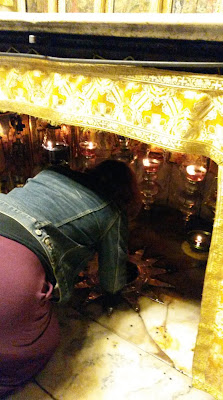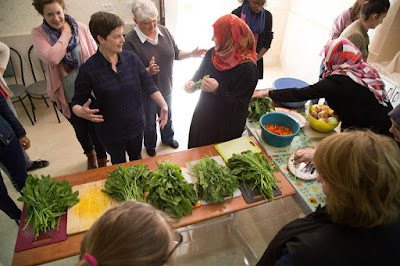Sermon for Sunday 20 December 2015: 4th Sunday of Advent
Sermon for Sunday, 20 December 2015
4th Sunday of Advent
The Rev. Carrie Ballenger Smith
+++
Grace and
peace to you from God our Father and the Lord Jesus Christ.
Earlier this
week I took my friends Stacy, John, and Cate to Bethlehem for their first visit
to the Church of the Nativity. It actually took two tries to reach that
fourteen-pointed star on the floor of the cave. The first time we entered through
the exit because of renovations underway, but then we were shooed out quickly, along
with a large group of Nigerian pilgrims, because a Mass was about to begin.
 |
| My friend Stacy visiting the site of Jesus' birth Photo by Carrie Smith |
On the
second try later in the day, we entered through the regular entrance and stood in
line behind a Muslim family—the mother in hijab, the father listening carefully
to the tour guide, and a small son carrying a Spiderman backpack.
When it was
our turn, I stood back to take photos of my friend as she reached in to touch
the site where Jesus was born. As I did, a nearby tour guide decided to speak
to me.
“You need
help?” he asked.
“No, thank
you.” I replied.
“But do you
know about this place?” he insisted.
“Well, yes,
I do. I’m actually a pastor.”
You can
guess what happened next.
The idea of
a female priest was such a surprise that it made this tour guide’s mouth hang
open and his eyes grow large. He was very nice about it, though, and when he
saw me a little later in the day he called out to me loudly, “Ya, Assiseh!”
This wasn’t
the first time that being both a clergyperson and a woman meant I was a disturbing presence for the people around
me. But it was the first time it happened in
a birthing room.
After all,
that’s what the Church of the Nativity is – a church built around a birthing
room. That cave, with its candles and tapestries and marble and paintings, now guarded
intensely by clergymen of several
traditions, was at least on one Silent and Holy night probably filled with women.
Somehow, our
tradition has forgotten (or intentionally hidden) the fact that if the arrival
of the Messiah happened through a woman, she was most likely also surrounded by
other women. Where is the midwife in our nativity scenes, after all? Where are
the wise women who brought food and did the cleaning for Mary in the days after
the birth of Jesus?
It’s no
secret that our cultures have often hidden the presence of women in both history
and holy scripture because they were considered either insignificant or
inappropriate.
And this is what makes this morning’s reading from the first
chapter of Luke so astounding. This morning, on the last Sunday of Advent and
just a few days before Christmas, we are reminded in a powerful way that the
story of the salvation of the world includes some insignificant and inappropriate
people – specifically women.
 |
| Mary Greets Elizabeth |
This morning’s
reading from Luke features Mary and Elizabeth – two pregnant women -- having a
deep conversation. It includes the description of the baby kicking inside Elizabeth’s
womb. The story even includes singing!
If this were a movie instead of a Sunday morning Scripture reading, it would probably
be classified as a “chick flick.” The movie companies would market it to women
only and would print the posters in shades of pink. Can you imagine the
advertising campaign? “This Christmas, leave the men at home and come to see
the heartwarming story of Mary and Elizabeth: two pregnant women from very different
stages of life, but both part of the same miracle.”
But of
course, this Scripture lesson is not for women only, and the Gospel is not a “chick
flick.” The story of Mary’s visit with Elizabeth is a vital part of the
Christmas story, and appropriate for all audiences. It’s about friendship and family.
It’s about having courage and faith when faced with great challenges.
But chiefly,
the story of Mary and Elizabeth is about how God is doing amazing, unexpected, even
unacceptable things through amazing, unexpected, and even unacceptable people all
the time. After all, the story of God’s love for the world, from Genesis to
Revelation, includes various unusual choices:
Rahab was a prostitute and is also
one of the ancestors of Jesus.
King David stole his friend Uriah’s wife.
The
Apostle Paul persecuted Christians before he became one.
Zaccheus was a wee
little man (at least, that’s how the song goes) but more importantly he was a
tax collector who ended up hosting Jesus for dinner.
And let’s
not forget Jesus himself – born in Bethlehem (a village so small that it barely
counted among the clans of Judah), denied a room to be born in, chased out of
the country by King Herod, misunderstood throughout his entire ministry,
falsely accused and then publicly executed.
Is this what the world expected
from the Messiah?
Would we have thought to look in a manger for the Prince of
Peace, or to the cross for our King?
God’s love
for the world has been revealed to us through many unexpected and even
inappropriate people. And today Holy Scripture invites us, through the story of
Mary and Elizabeth, to rejoice in the unfailing goodness of God in every
circumstance. We are invited to join in
Mary’s song of great joy, of deep faith, and of absolute trust that a good God
is at work in the world even through imperfect people. Even in the middle of a
crisis. Even when our faith is weak. Even when there seems to be no path to
peace. Even through a woman well beyond childbearing age. Even through an
unmarried, pregnant teenager.
Even through us.
On Monday, I’ll
be taking our friends back to Bethlehem—actually to Aida Refugee Camp—for a
cooking class. A camp resident named Islam and her friends started teaching classes
there as a way to support their disabled children. It started in Islam’s
kitchen, and has now expanded to a larger space, renovated by her husband. I’ve
taken many visitors to these cooking classes, partly because the experience of
being in a refugee camp is one most have never experienced before, and partly because
the food is outstanding.
But there’s
another reason, too. I take people to these classes because I see God at work
through the women of Aida camp. I see Western eyes open wide when we walk
through the streets of the camp. I see smiles when visitors make human
connections with Palestinians they have only seen on the news. I see hearts
open up when Christians are welcomed into a Muslim home and share a meal they
have cooked together.
I see that
the God of Mary and Elizabeth, the God of Sarah and Rahab, the God of Mary
Magdalene and Hannah, is doing great and unexpected and even unacceptable things
around a dinner table, in a refugee camp, behind a wall, in occupied territory,
through women.
Through Muslim women.
And this
gives me courage. Like Mary, when I think of all the great things God has done
and is doing through unexpected people—even through me!—it makes me want to
sing. It makes me want to praise God as Mary did in the Magnificat:
“My soul
magnifies the Lord, and my spirit rejoices in God my Savior, for he has looked
with favor on the lowliness of his servant. Surely, from now on all generations
will call me blessed; for the Mighty One has done great things for me, and holy
is his name.”
Mary sings because
she knows that although she is lowly, although she is young, although she is
unmarried, although she is insignificant and even inappropriate, she can do great
things. She can even bear the savior of the world.
She can do
it, not because she is great, but because God is good.
She can do
it, not because she is so special, but because God is so faithful.
“God’s mercy
is for those who fear him from generation to generation.
he has shown
strength with his arm; he has scattered the proud in the thoughts of their
hearts.
He has
brought down the powerful from their thrones, and lifted up the lowly;
he has
filled the hungry with good things, and sent the rich away empty.
He has
helped his servant Israel, in remembrance of his mercy,
according
to the promise he made to our ancestors, to Abraham and to his descendants
forever.”
This is Mary’s
song, but it is also ours. As we approach Christmas Day and the celebration of the
birth of the Messiah to a young girl in a stable in the little town of Bethlehem,
we are invited to sing praises to the God who did such a wild, unexpected,
inappropriate, wonderful, blessed thing.
Thanks be to
God, we are gifted with voices to sing God’s praise. We are gifted with hands
to continue God’s work. And we are gifted with courage and faith – the courage
and faith of Mary, who unexpectedly was given the chance to carry the salvation
of the world in her womb. Amen!

Comments
Post a Comment